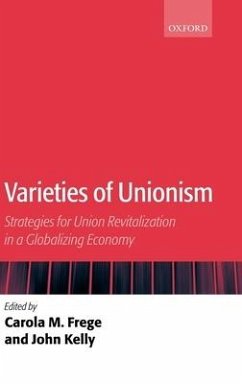As unions face an ongoing crisis all over the industrialized world, they have often been portrayed as outmoded remnants of an old economic structure. This book argues that despite structural shifts in the economy and in politics, unions retain important functions for capitalist economies as well as for political democracy. Union revitalization in the face of their current difficulties is therefore of fundamental importance.
The book charts the strategies unions are using to respond to global union decline and to revive their fortunes in five countries - US, UK, Germany, Italy and Spain - providing a wide range of institutional settings, union structures, identities and union responses. It provides a rich source of documentation about union activity, but more importantly it goes beyond description to address two of the big questions in comparative research: How can we explain cross-country differences of union
responses to global decline? And how effective are these actions in helping to revitalize the labour movements?
Union strategies and union revitalization outcomes varied strongly across countries and were shaped by national industrial relations institutions, as well as by the interactions between union, employer and state strategies. These findings support the argument for national divergence of the varieties of capitalism literature and challenge the globalization thesis which predicts a degree of convergence in the fate of union movements across the advanced capitalist world. There is no single
revitalization strategy that works well for all union movements; the same strategy is likely to produce different results in different countries. Moreover, evidence for variation in revitalization outcomes emerges most clearly when we adopt a multi-dimensional conceptualization of revitalization, moving
beyond union membership and density to embrace economic and political power as well as the institutional dimension of union reform. Despite serious revitalization attempts in all countries the scale of revitalization is extremely modest when compared to the great upsurges of unionism in history.
Varieties of Unionism presents important research and analysis of union strategy for academics and graduate students of Industrial Relations, Management, Politics, Political Economy, and Sociology.
Hinweis: Dieser Artikel kann nur an eine deutsche Lieferadresse ausgeliefert werden.
The book charts the strategies unions are using to respond to global union decline and to revive their fortunes in five countries - US, UK, Germany, Italy and Spain - providing a wide range of institutional settings, union structures, identities and union responses. It provides a rich source of documentation about union activity, but more importantly it goes beyond description to address two of the big questions in comparative research: How can we explain cross-country differences of union
responses to global decline? And how effective are these actions in helping to revitalize the labour movements?
Union strategies and union revitalization outcomes varied strongly across countries and were shaped by national industrial relations institutions, as well as by the interactions between union, employer and state strategies. These findings support the argument for national divergence of the varieties of capitalism literature and challenge the globalization thesis which predicts a degree of convergence in the fate of union movements across the advanced capitalist world. There is no single
revitalization strategy that works well for all union movements; the same strategy is likely to produce different results in different countries. Moreover, evidence for variation in revitalization outcomes emerges most clearly when we adopt a multi-dimensional conceptualization of revitalization, moving
beyond union membership and density to embrace economic and political power as well as the institutional dimension of union reform. Despite serious revitalization attempts in all countries the scale of revitalization is extremely modest when compared to the great upsurges of unionism in history.
Varieties of Unionism presents important research and analysis of union strategy for academics and graduate students of Industrial Relations, Management, Politics, Political Economy, and Sociology.
Hinweis: Dieser Artikel kann nur an eine deutsche Lieferadresse ausgeliefert werden.








